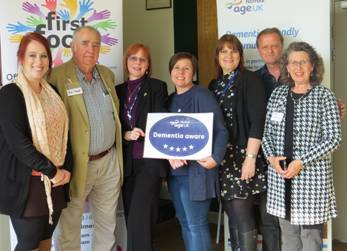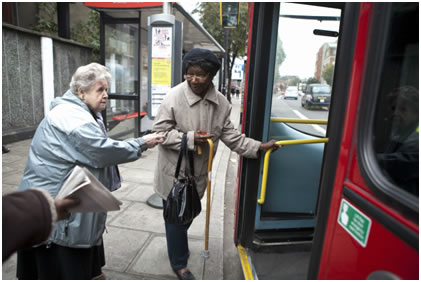

Awareness and public understanding
Public awareness and a better understanding of dementia are needed to break down the stigma that people living with the condition face. Nearly two thirds of UK adults surveyed in the YouGov poll agree that stigma is a barrier to people with dementia being active in their community and only 21% think that the public’s understanding of dementia is fairly good or very good. There is therefore a widespread recognition of the need for greater awareness and understanding. Misinformation about dementia was also identified as an issue, and many people in the general public fear the condition. A key element of a dementia-friendly community is ensuring that people with dementia no longer feel ashamed or embarrassed by their condition. Increasing community understanding is paramount to breaking down the stigma of dementia and improving diagnosis rates.
For information about Dementia Awareness and or Training for Businesses, groups and organisations in Norfolk please contact Amelia Worley, Age UK Norfolk, tel. 01603 787111 or email. amelia.worley@ageuknorfolk.org.uk.
For information about becoming a Dementia Friend go to www.dementiafriends.org.uk
For more information on Dementia please see links below:
www.dementiauk.org/understanding-dementia/about-dementia/
https://www.alzheimers.org.uk/dementiafriendlycommunities
The ‘Dementia Friendly Employers resource pack’ – the work of the Dementia Strategy Implementation Board’s ‘Dementia Friendly Employers’ group (and various subgroups) – is now available on the Dementia Friendly Norfolk http://www.dementiafriendlynorfolk.com/employers website.
Frequently asked questions
Answers to some commonly-asked questions about dementia, memory, risk factors and treatments
Please visit:
http://www.alzheimersresearchuk.org/about-dementia/helpful-information/frequently-asked-questions/?gclid=CJmA8ouf-M8CFSMW0wodgcsA2w
Fakenham Dementia Friendly Community Project Aims
- To provide empowerment to individuals living with dementia
- Our purpose is to establish a Dementia friendly community in Fakenham and its surrounding villages so that people living with dementia and their carers are able to access the social life, businesses and amenities in the community. The Community Engagement team, in partnership with colleagues from the Alzheimer’s Society and Age UK North Norfolk, people affected by dementia and external stakeholders will work as a team to:
- Design and deliver programmes which raise awareness of dementia
- Make friends, families, workplaces and organisations aware of dementia and give them guidance and training on how to become dementia-friendly.
- Create the structure needed to share information and learning between geographical and interest groups, to build dementia friendly communities.
- Partner with other organisations involving people with dementia, and from particular geographical and interest groups to learn how best to include people affected by dementia.
- Produce sector guides and checklists on becoming dementia friendly, always informed by the voice of people with dementia.
- Inform policies and campaigns, marketing and media strategies.
The majority of people living with dementia want to be able to continue with day to day activities; this may include:
-Socialising -Going out for coffee or a meal
-Doing their weekly shop
-Hobbies and interests
A dementia friendly community is a community where people with dementia can:
-Find their way around and feel safe
– Access their local facilities
-Continue participating in social activities and clubs

The information below gives an overview of dementia and its various forms. Although usually associated with getting older, dementia is not an inevitable part of ageing and dementia can occur in younger people (early-onset dementia).
An Initiative Approach For Dealing With MISSING individuals with dementia
The Herbert Protocol
It is distressing enough when a loved one goes missing for any reason but the distress is compounded when the missing person has a significant medical problem. If the missing person suffers with dementia, the concern can take on an added concern. The writer of this article has personal knowledge of a friend with dementia who went missing whilst holidaying with his family in the South West area of England. Police and other agencies were involved and the family eventually returned home to Oxfordshire after having to leave the search to the authorities only to find the missing person safely in their home. To this day, they have no idea of how he got home but realise that the outcome could have been so different.
Help may be at hand in an initiative headed by Norfolk and Suffolk police entitled “The Herbert Protocol: Safe & Found” described as a vulnerable person profile tor people living with dementia. It seems that this was named after a gentleman with dementia known as Herbert went missing and the lessons learnt led to this initiative. To have to give descriptions of the individual in such distressing circumstances can, to say the least, prove difficult if not impossible with the heightened levels of anxiety.
The idea is in essence quite simple. A basic form is completed with various basic details of the person with dementia including address, contact details, description and a brief history of previous times that the individual was missing. The form is then kept in an appropriate place at home and at the police station and then shared when needed with the authorities. First Focus Manager April Simnor states “It’s a fantastic way to find detailed information out quickly and easily hopefully resulting in the quick discovery of the vulnerable person”.
For more information please get in touch with Norfolk or Suffolk police non emergency services or First Focus Fakenham Dementia Friendly Steering Group. www.firstfocus.org.uk
Forms are available from First Focus Fakenham in Oak Street, behind the town’s library or the Fakenham Police station.
Memory loss
In later life, your memory may not as good as it used to be. It’s normal for your memory to be affected by age, stress, tiredness, certain illnesses, depression and medications. However, if memory loss is affecting your daily life or is worrying you or someone you know, you should visit your doctor for advice.
Not all memory loss is untreatable. It may be caused by other medical or psychological problems that can be treated. However, if the memory problems are due to dementia-type illnesses, early diagnosis is key to accessing appropriate treatment and support.
Mild Cognitive Impairment

Sometimes a doctor will assess and diagnose a person as having Mild Cognitive Impairment (MCI). This diagnosis is given when the person has mild memory problems but symptoms are not severe enough to support a diagnosis of dementia. For example, a person may become aware that their memory is not as good as usual or find they are having difficulty concentrating or thinking clearly. Having a diagnosis of MCI does not mean you will go on to develop dementia.
Side by Side – Project Alzheimer’s Society

What does the service hope to achieve?
- Enabling people with dementia to lead fulfilling lives.
- Reducing isolation and loneliness in people with dementia.
- Ensure people with dementia are not excluded from services and activity, and are able to remain active and involved in their communities.
- Combat social isolation and the loneliness this can lead to.
- Empower people with dementia to develop their own solutions and responses to meet their identified needs and wishes.
- Support people with dementia to identify their own personal talents, strengths and capabilities, and what they can bring to their peers and the wider community.
- Develop and encourage community-based informal support networks for people with dementia.
- Link people with dementia and local volunteers to build networks of support and activity.
If you’ve been diagnosed with dementia, Side by Side is a new, free service from the Alzheimer’s Society that will help you do the things you love – or try something new.
With the support of a local volunteer you can continue doing the things you enjoy or take part in a new hobby or activity- it’s completely up to you.
Contact your local Side by Side Manager on 01603 763517 to find out more about we can help –
Fakenham is a Dementia Friendly Community
Our aim,
To promote individual and community based activities for people with dementia and their carers and contribute to the development of sustainable inclusive social activities and services. To also ensure people with dementia and their families have a voice and are able to maintain and, where necessary, increase their social contacts within their local community.
What are dementia friendly communities?
A Dementia Friendly Community aims to create communities which make daily living and activities easier and more accessible to people living with dementia. Dementia friendly communities are villages, towns and cities where more people understand dementia, there is less fear and avoidance, and people living with dementia are included and supported to live independently for longer.
Everyone is included!!
‘Everyone from governments and health boards to the local corner shop and hairdresser share part of the responsibility for ensuring that people with dementia feel understood, valued and able to contribute to their community’.

Being dementia friendly, is having an awareness that some changes, either practical or in attitude, are needed to help improve the well-being of someone affected by dementia and also reduce the stigma associated with the condition. The local business community can play a vital role in improving what can potentially be difficult situations for people with dementia and learn how simple changes to their customer services and environment can make a huge improvement to their customers with dementia. As well as Informational Workshops for organisations and businesses, anyone can become a Dementia Friend by attending a free 45 minute Dementia Friend Session. Please get in touch if you are interested.
What is Dementia?
Dementia is a condition associated with a decline in brain function that can affect memory, thought processes, language, understanding and judgment.
Other symptoms may include difficulty communicating, problems with reasoning and carrying out everyday tasks, particularly those which require planning, changes in personality, mood swings and periods of confusion.
Dementia is progressive. This means that symptoms experienced are likely to change and will become more severe over time.
Symptoms can vary according to the disease causing them and from person to person. They affect your daily life and are more than just occasional lapses. Symptoms of dementia include:
- Struggling to remember things that happened recently, even though you can easily remember things from longer ago.
- Struggling to follow conversations, particularly in groups.
- Forgetting the names of people or things.
- Struggling to follow a story on television or in a book, or understand magazine and newspaper articles.
- Having trouble remembering the day or date.
- Having trouble remembering where you put something, or where things are kept.
- Being unaware that you are repeating yourself or losing the thread of what you are saying in mid- sentence.
- Difficulty completing familiar tasks.
- Struggling to do things you used to find easy.
- Feeling confused even in a familiar place.
- Having problems controlling your mood, or controlling your emotions.
Both the person with dementia and those around them may not even notice the signs or take them seriously for quite some time.
Seeking further advice
If problems like these start to affect your daily life, it is worth sharing your concerns and making an appointment to discuss them with your GP.
If you are worried about someone else, try to encourage them to see their GP. You could offer to go with them for support if they seem a bit reluctant.
Dementia is not a hopeless condition and some of the difficulties can be prevented or reduced.

The symptoms and experience of dementia can vary greatly from person to person. How quickly the symptoms deteriorate and the way they develop depends on the cause of the person’s dementia, their overall health and other factors.
Businesses/ organisations already signed up;

Tesco’s
Here at Tesco Fakenham we want to be a genuine benefit to all our local community. We want that to be inclusive of all customers, taking into account their individual needs. With our recent involvement with first focus and their fantastic work with people suffering from dementia, their families and carers we see a possible pocket of need to make available slots where we make one of our colleagues available to support them with assisted shops. We already offer this service to blind and partially sighted customers. We believe by extending this service to those with dementia this will help maintain a quality of life for them. If this is something you think we may be able to help you with please don’t hesitate to contact First Focus or myself.
Sara Sayer
Community Champion – 07718517961
Norfolk Police have invested a significant amount of work on improving the way the police service responds to people who suffer from mental health issues. An initiative has been implemented to ensure that we help people in the most effective way when they call upon police and health care services.
Norfolk Police now have a mental health team located within our control room and they can be contacted for information, advice and also as a conduit to communicate with other professionals.
All officers have had training on mental health including Dementia and are aware of the difficulties surrounding this condition. Dementia is a collection of symptoms that can occur due to a variety of possible diseases.
Norfolk Police are also trialling (The Herbert Protocol) this is a vulnerable person profile- for people living with dementia. Copies can be downloaded from the link below:.
Norfolk Police – Blank Herbert Protocol Form
Rotary Club
The Rotary Club of Fakenham & District support the Dementia Friendly Community Fakenham initiative. They have a presence on the Steering group to create awareness and help drive the project forward. The aim is to ensure more people become Dementia Friends and more local businesses have access to the Dementia Awareness workshops in order for families living with dementia can continue to enjoy their lives.
Brenda Parcell
Groups Around Fakenham

Fakenham Activity and Support Group
Location: The Salvation Army Church, Oak Street, Fakenham, NR21 9DY
Time: The first Wednesday of every month, from 10.30 -12.30pm
For more information, please contact your local Alzheimer’s Society office in Norfolk on: 01603 763556 or norfolk@alzheimers.org.uk
First Focus has a program of events targeted towards all abilities. We also offer Cognitive Stimulation Therapy (CST) which is a series of psychosocial treatment sessions. CST, is a brief treatment for people with mild to moderate dementia. ‘Dementia’ is an umbrella term, the two main types being Alzheimer’s and Vascular dementia. CST was designed following extensive evaluation of research based evidence. Group CST treatment involves sessions of themed activities, which will run once weekly. The sessions are aimed to actively stimulate and engage people with dementia, whilst providing an optimal learning environment and the social benefits of a group.
Dementia Friendly Lunch Reeve’s Parlour Restaurant on the last Monday of each month- excluding Bank Holidays.
Time 12.30-2.30pm – At the Bawdeswell garden centre NR20 4RZ
Please book directly on 01362 688387 and select option 1 to reserve your seat.
Rosemary Rooms
Open Every Monday 10.30-12.30pm
For individuals with dementia and their families at the Hempton Church Hall. Contact Judith on 01328 864061 or Pam 01328 829735
www.alzheimers.org.uk
Call our Helpline number below or use the Live Online Advice service for dementia information and support
Dementia Helpline:
0300 222 11 22
The Nurture Project

The Nurture Project uses nature to nurture good health and well being. An independent organisation, it is based in tranquil settings 3 miles east of Fakenham and supports people with a wide range of mild to moderate mental health conditions, including those living with dementia. Clients work closely with a Nurture Project horticultural therapist carrying out a variety of tasks, mostly gardening activities, to improve their particular health needs, and to work on certain goals they would like to achieve. At the project the garden is seen as a safe and secure place to develop someone’s ability to mix socially, gain confidence and learn practical skills that will help them to be more independent.
The Nurture Project is already a recognised dementia friendly business, but would very much like to develop its services whereby it can provide support not only to those living with dementia, but to provide respite support to carers too.
If you would like to find out more about The Nurture Project please do get in touch with Carlyn Kilpatrick on 07976 233777
Telephone: 07976 233 777
Email: hello@thenurtureproject.co.uk
Website: www.thenurtureproject.co.uk
